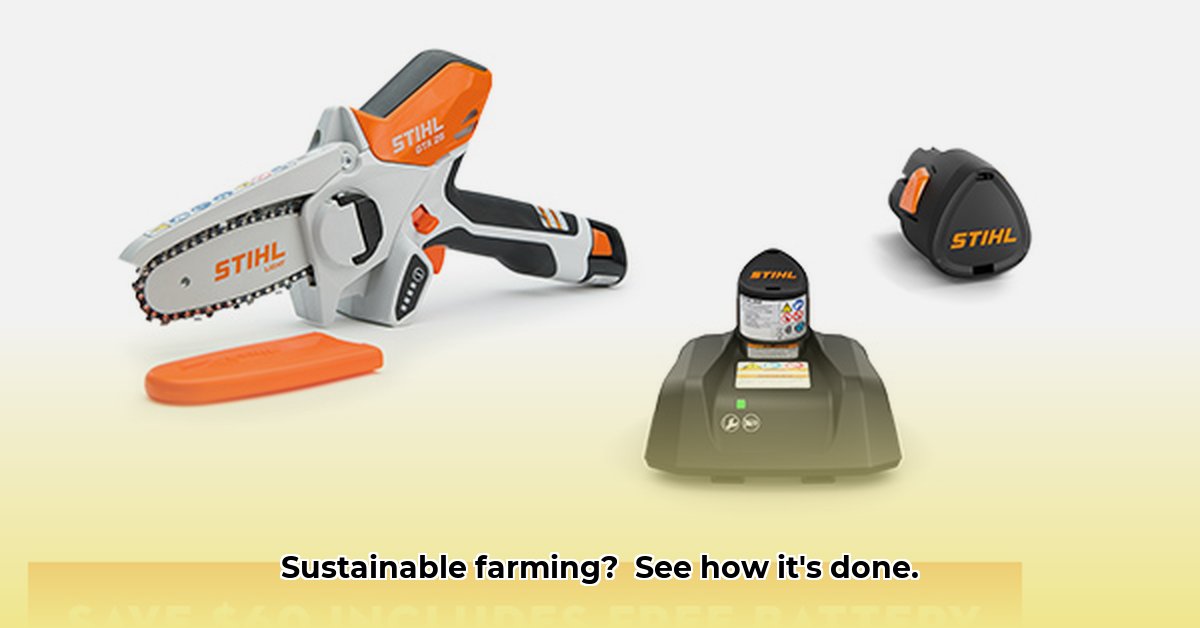
Cook Tractor Company's Position in Sustainable Agriculture
Cook Tractor Company, a long-standing presence in Vicksburg, MS, enjoys a robust reputation for reliable service and strong farmer relationships. However, the agricultural sector is undergoing a significant shift towards sustainable practices. While Cook Tractor's history and customer loyalty are substantial assets, a proactive embrace of sustainable agriculture is crucial for its continued success and growth. This article analyses Cook Tractor's current standing, the opportunities presented by sustainable agriculture, and outlines actionable steps for the company to become a leader in this evolving market. For information on land clearing techniques, see this helpful guide.
Current Landscape and Future Potential
Cook Tractor's deep roots in the Mississippi Delta community and its proven track record of reliable service are undeniable strengths. Its customer-centric approach fosters strong relationships, laying a solid foundation for future expansion. However, a noticeable absence of overt commitment to sustainable agriculture presents a significant opportunity. The company possesses the essential building blocks; what's needed now is a strategic shift to integrate sustainability into its core operations.
The Growing Demand for Sustainable Agriculture
The agricultural industry faces increasing pressure to adopt sustainable practices. This pressure stems from several key factors: growing consumer demand for sustainably produced food, heightened awareness of climate change and its impact on farming, and increasingly stringent environmental regulations. This presents a substantial market opportunity for businesses willing to adapt and lead the charge toward environmentally responsible farming methods. Farmers are actively seeking solutions that minimize their environmental impact while maintaining productivity and profitability.
Cook Tractor's Potential for Sustainability Leadership
Cook Tractor is well-positioned to become a leader in sustainable agriculture. Its established customer base provides a built-in network for introducing and promoting sustainable technologies and practices. The company can leverage existing relationships to offer new services centered around efficiency and environmental responsibility, such as:
- Consulting on water conservation techniques.
- Offering fuel-efficient tractors and equipment.
- Providing access to precision agriculture tools that minimize waste and optimize resource usage.
This holistic approach strengthens customer relationships and positions Cook Tractor as a valuable partner in building a sustainable agricultural future.
Actionable Recommendations for Sustainable Success
Phase 1: Immediate Actions (0-1 Year)
Comprehensive Equipment Assessment: Conduct a thorough analysis of the current product portfolio to identify opportunities for incorporating sustainable technologies, such as biofuel compatibility or highlighting existing energy-efficient models. This assessment should also consider the needs of customers and identify gaps in the current offerings.
Strategic Supplier Partnerships: Form alliances with suppliers specializing in sustainable agricultural technologies. This collaborative approach provides access to innovative solutions and industry expertise, facilitating a smoother transition to a more sustainable product portfolio.
Targeted Customer Engagement: Implement a proactive communication strategy that highlights the environmental benefits of current and future product offerings. This could involve workshops, educational materials, or personalized consultations emphasizing both the financial and environmental benefits of adopting sustainable practices.
Phase 2: Long-Term Strategy (2-5 Years)
Develop a Comprehensive Sustainability Plan: Create a detailed, long-term sustainability strategy outlining specific, measurable, achievable, relevant, and time-bound (SMART) targets regarding emissions reduction, water conservation, and soil health improvement.
Strategic Partnerships: Build collaborative relationships with organizations focused on sustainable agriculture, leveraging their expertise and resources for mutual benefit. This could encompass joint educational initiatives, collaborative research, or shared marketing efforts.
Invest in Employee Training: Equip the workforce with a thorough understanding of sustainable agricultural practices. Providing in-depth training empowers employees to effectively promote and support sustainable farming methods, strengthening the customer relationship and building brand credibility.
Collaborate with Government Agencies: Actively engage with governmental agencies and industry organizations to access available grants, incentives, and guidance on sustainable agricultural practices. This collaborative approach provides valuable support and enhances the company’s ability to implement its sustainability strategy effectively.
Mitigating Risks: A Proactive Approach
Successful implementation of a sustainability strategy requires careful consideration of potential risks:
| Risk Factor | Likelihood | Impact | Mitigation Strategy |
|---|---|---|---|
| Limited market demand for sustainable tech | Medium | Medium | Comprehensive market research demonstrating clear ROI (return on investment) for farmers. |
| High upfront investment costs | High | High | Explore financing options, leasing programs, and a phased approach to technology implementation. |
| Regulatory uncertainty | Medium | Medium | Continuous monitoring of regulations, engagement with policymakers, and adaptable strategies. |
| Competition from established players | High | High | Development of niche expertise, personalized service, and strong customer relationships. |
Conclusion: A Sustainable Future for Cook Tractor
Cook Tractor stands at a pivotal moment. To maintain its competitiveness and ensure long-term success in the agricultural industry, a proactive shift toward sustainable practices is not just an option, but a necessity. By implementing the steps outlined above, Cook Tractor can cement its position as a leader in sustainable agriculture, enhancing its reputation, attracting new customers, and contributing to a more environmentally responsible and profitable future for Mississippi farmers. The choice to embrace sustainability isn't just environmentally responsible; it's strategically sound.